Schlagwort: ‘Mechanical Engineering’
Becoming a Commercial Diver at NYD
- Maschinenbau B.Sc.
- Norway, Fagerstrand
- NYD (Norsk Yrkesdykkerskole)
- 11/2024 – 03/2025
Diving has been a life long passion of mine and thanks to Erasmus+ I had the chance to combine it with my studies in mechanical engineering to go to Norway for four months to become a Commercial Diver at NYD (Norsk Yrkesdykkerskole).
I got to spend a beautiful winter across the Fjord from Oslo in a small town called Fagerstrand filled with around sixty upcoming and eager divers from all around Scandinavia and the world.
The first two weeks were the basic theoretical foundation for diving: physics, medicine, first aid, seamanship, usage of diving equipment, fire hazards, decompression tables and pressure related effects of breathing gases. Everyday we learned about new subjects and gathered in groups to study and work on the assignments.
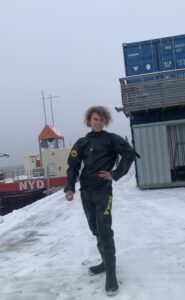
©Andreas Pietzcker
Before we could start diving we had to pass a medical check, fitness tests and a chamber dive to 50 meters to test our nitrogen tolerance. Breathing nitrogen at high pressures leads to the so called Nitrogen Narcosis or „Rapture of the Deep“. Usually the symptons set in at 30m and feel a bit like being drunk. The narcosis gets stronger the deeper you go (divers call this the Martini effect), so naturally at 50 meters we were in quite a cheerful mood. The air felt viscous due to the high pressure, you felt the high breathing resistance and most notably it changed your voice, making all of us sound like Donald Duck.
So naturally we sat in the cramped chamber bursting with laughter.
The first day of diving was filled with excitment. New equipment, check lists, for a few of us the first time they would ever get to experience the feeling of weightlessness underwater. I had been diving since I was twelve but this was a whole different world for me. Our equipment weighed in at around 30 kilos and we were glad when we climbed down the ladder into the water and could finally float.
Then we practized our bouyancy, an essential skill, to maintain a neutral position and neither sink nor ascent to the surface uncontrolled. We learned how to rescue an unconscious diver and bring him back safely, how to operate the winch to heave him out of the water and get him on a stretcher to perform first aid.

©Andreas Pietzcker
We were diving from Buldra, a dynamic positioning vessel (DPV) which uses it’s thrusters to maintain a fixed position in the water with pinpoint accuracy allowing divers to work safely. After a week of familiarizing ourselves with the equipment we took Buldra out to sea and dove from the wet bell. The wet bell uses the same principle as the first diving bells; it creates an air pocket within the bell with an open bottom, which allows divers to leave and return. In case of equipment failure the air pocket is our safe haven. During these dives we performed several inspection tasks on the bell, checking for example the electrical connections or the shakles used to attach the bell to the guide wires. The deepest dive with the wet bell was to 27m.
The next two weeks we learned about diving from the dry/closed bell and the transfer under pressure. The difference between the wet bell and the dry bell is, that on the dry bell we have a hatch which allows us to seal the bell on the bottom and maintain the bottom pressure while the bell is going up to the surface, whereas the wet bell’s pressure is always equal to the surrounding pressure.
The advantage is that the divers can be safely transferred under pressure (TUP) to a surface chamber, where they can decompress. The closed bell is used for deeper dives and saturation diving. On the station our worktask was to assemble different pipes using flanges to build a simulated distribution block for oil.
We learned about rigging and operating whinches. Underwater we guided them into place by making fine adjustments with a chain hoist and carefully positioning each part. We made sure the connection would not leak by using rubber gaskets and then screwed the pieces together using bolts. Especially important for making a good connection was the proper tightening of the bolts, where we did several passes tightening them little by little and always crosswise to make sure the pipes were properly connected.

©Andreas Pietzcker
Then we learned the use of lifting bags. Our goal was to lift a steel structure weighing about one metric ton. To figure out the weight we dove and took measurements of all the H-beams that make up the steel table. We worked out a total weight of nearly 950kg.
To prevent an uncontrolled ascent of the load we first rigged the table to a so called dead-mans-anchor. If we would fill the lifting bag to its total capacity the load would rise to the surface uncontrolled, where the bag would turn over, dump the air and come crashing down onto the divers. The dead mans anchor prevents this. This is just one example of the many things we learned about proper rigging, how to connect shackles and make sure they are loaded properly.
We filled the lifting bag and when we saw to table beginning to rise we could lift it with our bare hands and move it along the seabed.
We were also working on the pillars that make up the pier. We constructed a wooden frame underwater to be able to pour concrete. For the frame we cut 2×4 wood pieces into the correct length and profile of the bottom. To install rebar we used a pneumatic rock hammer drill to drill into the granite seabed. One diver operated the drill and the other diver guided the tip of the drillbit using a so called “Sea mans wife”. The drill we used uses around 60 liters of air per second. Which meant a whole lot of bubbles for us which made it rather difficult to see where we were drilling.
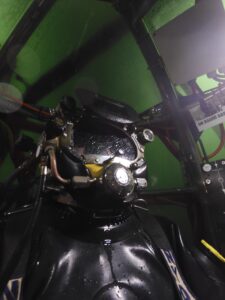
© Andreas Pietzcker
We learned how to use the AH3 and AH5 (air hat) free flow helmets. Their design is based on the old diving helmets like the Siebe Gorman whose history stretches back over a century. The difference of a free flow helmet is that there is a constant supply of air to the diver instead of a demand system, where air is supplied only when the diver breathes.
The helmet is connected to the dry suit and excess air has to be dumped with a valve that can be operated by pushing it with the side of your head. Again we were working on the concrete pillars, excavating and cleaning away the surrounding seabed to expose the bedrock. For cleaning we used an air lift which sucks away material using a difference in pressure and high and low pressure water jets as well as shovels to move material.
At around 15m there was an old steel tank which had been encrusted with barnacles and other types of sea life. We cleaned the tank using a hydraulic brush and got it nice and shiny again. As you would have expected of a group of guys, while we cleaned the surface we used parts of it for our own artistic expression.
We continued with deep dives up to 50 meters which also is the maximum depth a diver can work at breathing air because of the toxic effects of nitrogen and oxygen at these high pressures. We also did surface decompression. After deep and long dives the body builds up nitrogen which has to be released slowly or bubbles form in the divers blood which can have fatal consequences. To avoid this divers do decompression stops, which can be impractical because of long times in freezing water or waves. Surface Decompression works by lifting the diver quickly out of the water and recompressing them to a depth of 15m where they start breathing pure oxygen. To avoid bubbles from forming this has to happen quickly, within five minutes.
One of the most exciting things to learn about was underwater wet welding. Using specially made electrodes we practiced fillet welds and T-joints. Underwater welding is very different from welding on land, because the weld cools extremely quickly and has a tendency to crack if one works to fast. After joining a lot of steel plates together it was time to take them apart again by oxy-arc cutting. And electrode is ignited and supplied with a steady stream of oxygen which enables and exothermic reaction so that the tip of the electrode burns at around 5000 degrees celsius. This made short work of the steel plates which melted away like butter. It was an incredible experience to stand less than half a meter away from this bubbling and glowing metal next to a stream of smaller and sometimes larger explosions if a pocket of hydrogen gas had formed.
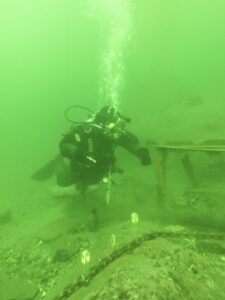
© Andreas Pietzcker
Lastly we trained on using Scuba gear and the Interspiro mask. This is the equipment used mostly by firemen and rescue divers and we practiced search patterns for lost objects (we had a chain and, of course, a gun), rescuing an unconscious diver, did inspection dives and cleaned the hull of the dive vessel Buldra, where we had started to dive all the way back in November.
It sounds crazy but diving into freezing water with equipment that weighs nearly as much as you do, is an amazing and fun experience. It is truly something extraordinary, the feeling of floating weightlessly in the water or walking with lead boots along the seabed like the astronauts on the moon.
Diving is a team effort and I was priviledged to work with some amazing, caring and professional individuals during this four month stay. We grew together as a group and took care of each other.
Every day there were new challenges and new things to learn and new experiences, so every morning I was glad to go there. And in the evenings we met, cooked and laughed together, watched movies, had barbeques or went out to Oslo to party.
There are so many different aspects to diving that it is hard to put into words but in essence it is a gateway to a truly unique world where adventures await. I will never forget the time I spent in Norway nor the lessons that I have learned and I am hoping that this will just be the beginning of an incredible journey. I want to thank Erasmus for giving me this opportunity and I will cherish these memories for a long time.
Internship at Mercedes Formula One Team in the UK
- Business Administration and Engineering: Mechanical Engineering B.Sc.
- United Kingdom, Brackley
- Mercedes-AMG Petronas Formula One Team
- 07/2023 – 07/2024
Application/Finding an internship
The application process for the internship was quite lengthy and kicked off around September 2022 for a start in July 2023. In England, it is very common for students to include a year in industry in their studies, so you will find many available internships across various fields. The duration is usually one year because this is the standard period for university students unless it is a pure summer internship. Ultimately, the internship duration will depend on which internship you apply for and what is offered by the companies you are applying to. If it is a bigger, international company, it is very likely that they will help you a lot with the application process for a visa and put you on a company insurance scheme. This can differ significantly between companies. Following people from that company on LinkedIn can help you if internship positions become available as they are often shared there too.
Accomodation & Living expenses
While grocery prices are in a similar range as German grocery prices, the costs for housing and running costs such as electricity, gas, and water will be significantly higher in the UK. For me, they came out at around £80/month per person in a shared house with two other people, which is very high. Rent was over £500/month per person too, which is around what you can expect in this area and is comparable to what other interns living in or near Brackley had to pay as well. Still, this comes as quite a shock when moving to the English countryside from a German university city. Breakfast, lunch, and dinner were served in the company restaurant, and I usually ate lunch and dinner there for £2.80 per meal. The food was delicious, and the menu changes every week to offer great variety.
As Brackley is a small town, you will have to work through the local letting agencies’ websites, but there is a good network of incoming and leaving interns that provides opportunities to easily take over apartments, which I highly recommend. This also alleviates the pressure to buy furniture as the places either come furnished or you will be able to buy furniture off your predecessors at a low price. To be able to rent an apartment, you will need a valid visa. Many letting agencies will be understanding of these circumstances and offer to wait for your visa approval. After the visa gets confirmed, you can then take the next steps to set up a UK bank account, for which I recommend Revolut. Also, with a registered address, you will be able to apply for an NI (National Insurance) number, which is crucial for the company to pay you a salary.
Everyday life/ the internship

© Nicolas Musiol
Apart from the amazing work atmosphere and interesting projects that the team entrusted me with, you will work alongside a young team and will join the company with a group of around 40 interns/industrial placements (short IPs). Working on projects together, enjoying lunches and dinners in the Hub (the company restaurant), quickly formed a big group of close friends. You’ll find yourself very quickly going to the local pubs or to parties in Banbury or Oxford together. Out of the 40 IPs, there is always a good mix of internationals with Brits. My year had people from Australia, the US, Canada, Luxembourg, Austria, Germany, the Netherlands, Croatia, Ireland, and England, which made for a very interesting mix of people.
Many other sports clubs give you the opportunity to mingle with locals, as Mercedes has its own cycling club, a football team, and many sports courses. Outside of the company, you will find a tennis club, a rugby club, and a leisure centre with a pool, so there are plenty of activities for you to do in your free time. I would also highly recommend volunteering at the local football club. Every Wednesday around lunchtime, they organize a lunch for the elderly and disabled at the clubhouse, and they are always looking for a helping hand. They have lovely stories to tell, and you will find that many of them can give you great recommendations as they know the area inside out.
Free time/tips
Weekend trips with my newly found friends took me to Liverpool, Bath, Bristol, Cornwall, and on a ski trip to the French Alps, and many smaller adventures. A fantastic weekend activity is trying to complete all the local parkruns, which is a local run event held every Saturday at 9 am over a distance of 5 km. You can put all your running experience to the test by competing in the annual Silverstone Race in May, where you lap the race circuit two times for a race distance of 10 km. Great views along the way and thousands of participating runners make it a great event.
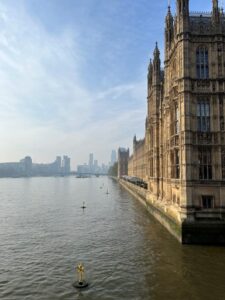
© Nicolas Musiol
Being located close to Banbury, which has a train station with a direct connection to Birmingham and London, one can hop on a bus to the neighbouring towns and villages to explore those or use them as a transit possibility to explore the country. A day trip or weekend trip to London is always great fun, and I’ve been many times now, as I’ve come to love London for the many different boroughs like Shoreditch, Camden, Kensington, Chelsea, and more. Each of them has a unique vibe, cool cafes, shops, restaurants, and pubs which are worth exploring.
Around Brackley, there are two airfields, both within walking distance. They make for a nice jog around them while small sports planes take off over your head or land on the small runways. For the daring, they even offer tandem parachuting. You can also visit the many golf clubs around and test your swing on the driving range. You only have to pay for balls as they will give you clubs to practice with if you don’t have any.
There are nice cafes all around Brackley as well, my personal favourites being The Old Fire Station in Brackley or the Post Office Café in Evenley. I can also recommend taking the bus to Oxford and visiting museums there, going punting on the canals, or visiting the local colleges.
There is also Stowe School in Buckingham only a few minutes away if you have a bicycle. The Stowe estate has a scenic park with many beautiful temples and arches. It makes for a nice afternoon stroll, especially on nice summer evenings.
Conclusion
All in all, I can only recommend committing to an international internship and immersing oneself in a foreign environment. Even though a full year exceeds the mandatory internship requirements of the RWTH, I can assure everyone it is an amazing experience, and I would do it again without a shadow of a doubt. I’ve greatly benefited from this year in the UK, not only professionally by working my dream job in F1 but also personally by meeting a lot of amazing people.
My experiences at Tsinghua University
- Business Administration and Engineering: Mechanical Engineering M.Sc
- China (VR), Beijing (Peking)
- Tsinghua University
- 09/2023 – 07/2024
Before the stay
Course Planning: It is recommended to get an overview of the selectable courses at Tsinghua University, depending on the respective department, such as Mechanical Engineering, Industrial Engineering, Energy & Power Engineering, and Automotive Engineering. Additionally, it is strongly advised to clarify which classes are eligible for acknowledgment – both Aachen courses at Tsinghua University and Tsinghua courses at RWTH Aachen. One must be cautious about course acknowledgements between Tsinghua University and RWTH Aachen. Based on past experiences, it is generally more challenging to get Aachen courses acknowledged at Tsinghua University than the reverse. This discrepancy necessitates early communication with both institutions. Students should verify which Tsinghua courses will be recognized for credit upon return.
Visa: After receiving the Tsinghua University acceptance letter confirming your stay abroad, a visa appointment should be made as soon as possible. It is likely that the Tsinghua University acceptance letter may arrive quite late. In the past, it was possible to make appointments at both the Düsseldorf Visa Centre and the Frankfurt/Main Visa Centre. Currently, according to my information, the Düsseldorf Visa Centre is closed. If time before departure to China is short, it is recommended to visit the Frankfurt/Main Visa Centre and pick up the visa personally. This way, it is possible to receive the visa within approximately 3-5 days, based on 2023 information. The visa application process involves filling out a detailed online form prior to the appointment. It is recommended to gather all necessary documents, including the acceptance letter, passport (which is valid for the whole stay plus six months, that is, at least 18 months), possibly recent photographs, before beginning the application. Completing this step efficiently can prevent unnecessary delays.
Health and Vaccinations: According to my GP in Germany, no extra vaccinations were needed. However, depending on your travel destinations in East Asia during the winter break in January and February, it might be recommended to receive vaccinations against typhus, hepatitis B, rabies (3-4 doses), and yellow fever. Students should consult their GP or healthcare provider in advance to ensure they are adequately prepared for any planned travel in the region. Besides, it is recommended to sign up for an international health insurance for the complete year.
Travels: It might be helpful to book a flight to Beijing about three months in advance. Possibly due to low demand for flights between Germany and China, the prices for one-way flights were generally rather low (between 350-500 Euros, depending on the booking time). For those planning a round-trip, one challenge is that flights generally can only be booked up to 365 days in advance. Given that the return flight will likely be in July, longer than a year from the outbound flight, this limitation can be an issue. One solution is to book a relatively inexpensive round-trip ticket and postpone the return flight once the return date is finalized. Some airlines offer flexible options for changing the return flight at a low cost, making this a potentially more economical option than booking two separate one-way flights.
Experience in the host country
Accommodation: Tsinghua University offers various dormitory options on campus for international students. There are three different room types available for internationals: First, single rooms with a private bathroom and a small sink (“Single Rooms”). Second, double rooms with shared bathrooms and separate bedrooms (“AB-rooms”). Third, double rooms that consist of a shared bedroom only (“Double Rooms”). The latter do not include any private bathroom or kitchen, as these are shared by the entire floor. The university is gradually renovating all Single Rooms, converting them into Double Rooms. Consequently, the likelihood of securing a Single Room or AB-room will steadily decrease over time. The 2023/24 Aachen cohort was the first to receive Double Rooms instead of Single Rooms.
Most of the 2023/24 Aachen cohort lived in Zijing Building 23, with a few students placed in Building 19 or Building 6. Buildings 6, 22, and 23 are recommended, if possible, as these are relatively newly renovated buildings.
In general, life in the dormitories is communal, with shared spaces like bathrooms and kitchens (depending on the room type). This setup encourages interaction among students, fostering a sense of community. However, it also requires some adjustment, particularly for those used to more privacy.
Dining and Food: Tsinghua University has a lot of dining halls on campus, offering a great variety of food options with a very high quality. The meals are very affordable (normally between 0,80 Euros – 3,00 Euros) and cater to diverse tastes, with a mix of Chinese cuisine and many international options. For those who prefer cooking, some dormitories have shared kitchens where students can prepare their own meals. The quality of the canteens, however, are outstanding for college food.
Off-campus, the Haidian district offers numerous restaurants and food stalls, where students can explore local Beijing cuisine. Street food is also popular and provides a quick and inexpensive way to enjoy traditional Chinese snacks.
Extracurricular Activities: Tsinghua University is known for its vibrant campus life. There are numerous clubs and societies catering to various interests, including sports, arts, music, and technology. For international students, joining these clubs is a great way to meet new people, practice language skills, and immerse in Chinese culture.
Sports facilities at Tsinghua are top-notch, with options for basketball, soccer, swimming, tennis, and more – all of them quite close to most of the international dorms (Zijing 18-23). The university encourages students to stay active, and many participate in regular sports activities. The high-end on-campus gym and fitness centers are also popular among students.
Cultural activities are abundant, with events such as traditional Chinese festivals and holidays, art exhibitions, and extraordinary performances regularly held on campus. Tsinghua’s proximity to cultural landmarks in Beijing also makes it easy for students to explore the city’s rich history during weekends or holidays.
Transportation: Getting around Tsinghua University is convenient, as the campus is well-connected by public transport. Bicycles (especially Blue Bikes from HelloBike) are a popular mode of transportation among students, as the campus is large, and cycling is often the quickest way to get to classes or dining halls. For longer trips, the Beijing subway system is easily accessible from the university, providing a reliable and efficient way to explore the city.
Challenges and Adaptation: For international students, adapting to life at Tsinghua can be both exciting and challenging. The language barrier and cultural differences may initially pose difficulties, but the university offers support services, including language classes and international student offices, to help ease the transition. The campus community is generally welcoming, and many Chinese students are happy and eager to practice their English and learn about other cultures, which can make integration easier.
Daily life at Tsinghua University is dynamic and diverse, offering a mix of academic rigor, cultural experiences, and social engagement. While the challenges of studying at one of China’s top universities can be demanding, the opportunities for personal growth and cultural exchange make it a rewarding experience for both local and international students. Whether through academics, campus life, or exploring Beijing, students at Tsinghua have the chance to engage deeply with both their studies and the rich cultural environment surrounding them.
Experience at the host institution
Academic Life: In our case, classes typically started at 9:00 AM in the first semester. The university offers a wide range of courses across its 21 schools and 59 departments. For international students, classes might vary depending on the department and program, but the workload is generally not too demanding, but quite extensive. Students often attend lectures, participate in group discussions, and engage in research projects. The grading in general is quite fair and benevolent.
Coursework at Tsinghua is challenging, with high expectations from professors. However, the university provides ample resources to support students, including libraries, research facilities, and academic advisors. International students may find the Chinese language barrier challenging at times, though many courses are offered in English, particularly in graduate programs.
Culture at Tsinghua: Tsinghua University provides a rich array of cultural opportunities that allow students to immerse themselves in Chinese history, arts, and traditions. The university regularly hosts cultural events such as Chinese music performances, traditional dance showcases, and art exhibitions that celebrate the country’s heritage. Students can explore Tsinghua’s and Beijing’s renowned museums (Tsinghua has got two of them), participate in traditional arts and crafts workshops, and attend festivals like Chinese New Year, the Mid-Autumn Festival, the Moon Festival, or the Dragonboat Festival which are celebrated with great enthusiasm on campus. Tsinghua’s proximity to cultural landmarks, such as the Forbidden City, the Temple of Heaven, and the Summer Palace, also offers students a chance to delve deeper into China’s historical treasures. Furthermore, engaging with Chinese students through clubs, sports, music, social events, and collaborative projects provides invaluable insights into contemporary Chinese culture and customs. These interactions foster cross-cultural friendships, where international students can learn directly from their peers about local traditions, cuisine, language, and daily life, enriching their overall experience at Tsinghua.
10 tips for new students at Tsinghua University on how to make the most of a one-year stay:
1. Explore Beijing’s Cultural Heritage: Take advantage of Tsinghua’s location in Beijing by visiting iconic landmarks like the Forbidden City, the Great Wall, the Summer Palace, and the Temple of Heaven. These historical sites offer a deep dive into Chinese culture and history.
2. Participate in Campus Festivals and Events: Engage in traditional Chinese festivals like Mid-Autumn Festival celebration on campus. These events provide a unique cultural experience and an opportunity to bond with fellow students.
3. Attend Cultural Performances: Tsinghua hosts various cultural events, including Chinese opera, (traditional Chinese) music concerts, and dance performances. These are great opportunities to experience traditional and modern Chinese arts firsthand.
4. Visit Local Markets and Try Chinese Cuisine: Explore Beijing’s and other cities’ local markets. In Beijing, the Silk Market and the Pearl Market are highly recommended, if you are interested in bargaining. Also, be adventurous with Chinese cuisine by trying local dishes such as Peking duck, hotpot, and dumplings.
5. Explore China Beyond Beijing: Plan trips to other parts of China during breaks. Visit cities like Shanghai, Xi’an, Qingdao, or Chengdu to experience the diversity of China’s landscapes, history, and culture.
6. Engage with Chinese Students: Building friendships with local students is invaluable. Join language exchange programs, participate in group projects, or simply hang out at campus cafes to foster these connections and gain deeper insights into Chinese culture.
7. Join a Student Club or Organization: Tsinghua has a wide range of student clubs, from sports across arts to technology. Joining a club is a great way to meet new people, develop new skills, and immerse yourself in campus life.
8. Learn Mandarin: While many courses are offered in English, learning some Mandarin will enhance your experience and make daily life easier. The university offers language courses, and practicing with local students will definitely accelerate your learning.
9. Take Advantage of Tsinghua’s Academic Resources: Make use of the university’s libraries, research facilities, and academic lectures. Attend guest lectures by prominent scholars and leaders from various fields to broaden your knowledge.
10. Stay Active and Use Campus Facilities: Tsinghua has excellent sports facilities, including gyms, swimming pools (inside and outside), and sports fields. Regular physical activity can help you stay healthy and relieve stress during your stay.
What added value did the stay have for my studies/career prospects?
A stay at Tsinghua University significantly enhanced my studies and career prospects in several ways.
Academic Excellence: Tsinghua University is renowned for its high academic standards and rigorous programs, especially in fields like engineering, technology, and business. The exposure to cutting-edge research, advanced coursework, a high focus on teamwork, and a global academic environment deepened my knowledge and skills in my field of study. This academic rigor might be highly regarded by employers and can set one apart in competitive job markets.
Language and Cultural Skills: Learning Mandarin and immersing myself in Chinese culture has been a big benefit, especially if one intends to work in industries or companies that have strong ties to China. Proficiency in Mandarin and an understanding of Chinese business practices can make someone a valuable asset to multinational companies or organizations operating in China.
Global Perspective: Studying at one of China’s top universities provides a unique international experience. It allowed me to gain insights into China’s rapidly growing economy, technological advancements, and global influence. This international exposure can make one more adaptable and culturally aware, qualities that might be increasingly valued in today’s globalized world.
Problem-Solving and Adaptability: Living and studying in a new country requires adaptability and resilience. The challenges I overcame during my time at Tsinghua, whether related to academics, language, or cultural issues, helped me to develop problem-solving skills and the ability to thrive in diverse environments. These are qualities that might be valued by employers in any industry.
Career Opportunities in China: China’s economy continues to grow, and having experience at a Chinese university like Tsinghua can open up career opportunities within China or with Chinese companies abroad. Being part of the Tsinghua alumni network can also provide valuable career opportunities.
Networking Opportunities: Tsinghua University attracts some of the brightest minds from China and around the world, offering an excellent opportunity to build a global professional network. The connections you make with fellow students, faculty, and industry professionals can open doors to future collaborations, job opportunities, and mentorship.
In summary, your stay at Tsinghua University not only enriches your academic background but also equips you with valuable skills, global perspectives, and professional networks that can significantly boost your future life both in China and internationally.
To what extent does my stay abroad have a sustainable character? To what extent could the general public also benefit from my personal experience?
My stay abroad at Tsinghua University has a sustainable character in both environmental and social aspects, with potential benefits that extend beyond my personal experience. By immersing myself in China’s approach to sustainability and environmental practices, particularly in areas like energy, engineering, and electromobility, I have gained valuable insights into how we can implement more sustainable solutions in our own communities. For example, learning about cutting-edge renewable energy technologies and urban sustainability initiatives at Tsinghua and in Beijing, especially regarding electromobility and public transport, allows me to bring back knowledge that can be applied to projects aimed at reducing environmental impact and promoting greener practices in my home country. This might contribute to a more sustainable future by helping to develop solutions that minimize resource consumption, lower emissions, and promote long-term environmental health.
On a social and cultural level, the public might benefit from my experiences through the sharing of cultural knowledge and perspectives. By engaging with local communities and sharing my experiences, I can help foster greater cross-cultural understanding and empathy, which is crucial in an increasingly globalized and polarized world. This cultural exchange can also lead to stronger social bonds and collaboration between different communities, promoting peace and mutual respect.
Emotionally, the empathy and cultural sensitivity I have developed through this experience allow me to better relate to people from diverse backgrounds, which can positively influence my interactions with others. This emotional experience can help in creating more inclusive and supportive environments, whether in the workplace or in the community.
Financially, the skills and knowledge I have gained might lead to more effective and innovative approaches in my field, which could translate into economic benefits. For example, by applying sustainable engineering practices learned, I can contribute to cost-saving measures and resource efficiency in projects, which benefits not only companies but also society as a whole by reducing environmental costs and promoting sustainable growth.
In summary, my stay at Tsinghua University allows me to bring back knowledge and practices that contribute to environmental sustainability, while also fostering social and cultural benefits for the public. By sharing my experiences and applying what I have learned, I can help create a more sustainable, inclusive, and interconnected society.
Getting to know a different culture
- Mechanical Engineering B.Sc.
- France, Signy L’Abbaye
- Beuret Sarl
- 09/22 – 12/22
My internship in France
The company I worked for produces agricultural equipment and steel structures for buildings. Since the company moved to a new location recently, they needed new custom equipment like tool cart for storing and moving heavy tools. I spent the majority of my time developing, designing in the office and manufacturing this equipment in the factory. Having the responsibility for those projects and completing them was a truly rewarding experience.
Even though I did not work on the division of the company that was responsible for the buildings they let me go on the respective construction sites a few times during my stay. Although this was not at all part of my internship, I still enjoyed discovering the big machines and assembly techniques they used to join the massive components that were previously prepared in the factory.
Working in a small company (about 10 persons in total) helped me to get to know all the people very quickly. I had a great relationship with both the employees and the supervisors from the beginning on which made my time in the company really enjoyable.
I worked a total of 40 hours a week which is not necessarily typical in France. Many people only work 35 hours. This makes room for other activities after work. Also, the meals have a much greater importance than in other European countries. Lots of companies have 60 to 90-minute lunch breaks and it is common for grocery stores and other shops to close during midday. But many stores make up for this by opening their doors on Sunday morning.
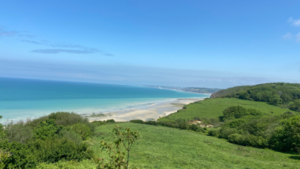
© Dimitri Robert
Luckily, on Fridays I only worked till 12 pm which made it possible to plan longer activities for the weekend. I tried to discover as much as possible of the “Champagne” region. It’s especially known for its production of champagne and its vineyards.
On another occasion I had the opportunity to travel to the beaches of the Normandy and admire the breath-taking landscape. These places are not only beautiful but also have an undeniably interesting historic relevance.
Travelling to these different destinations by train is difficult and takes a lot of time. In addition, the company I worked for was situated in a very rural area. So, having a car was a necessity in this region of the country.
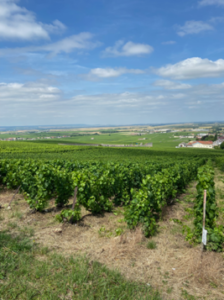
© Dimitri Robert
Something you need to get used to when you live in France are long and late dinners. Most of the time, they start with the well-known “apéro” where you have a few drinks and snacks before beginning to eat your meal. I really enjoyed those convivial evenings. I also observed that drinking wine at dinner was a lot more common than in Germany. Even a lot of young people enjoy drinking a glass of wine instead of beer. In general, the locals are proud of their local wine and especially champagne.
Helpful information
Good news is my phone worked without any issue thanks to EU-Roaming. On the other hand, German mobile network operators have put in place a limit of months that you can spend abroad. Exceeding this time limit will result in them charging you extra roaming fees. Luckily, many French carriers provide very generous offers for the first year of contract. Combined with a pricing that is generally much lower than in Germany, getting a mobile plan with a lot or even unlimited data becomes very affordable. Your mobile plan can even replace Wi-Fi. So, if you plan on staying more than a few months in France, I would definitely recommend getting a French mobile plan.
Same thing goes for your bank account and credit card. You should check with your bank if the card you plan on using works abroad. Opening a bank account was not necessary for me but it made withdrawing money free of charge and receiving my salary was also easier this way.
Keeping in mind that finding a fitting internship and going through the application process would take a bit longer than in my home country, I started to plan my stay more than 6 months ahead. This gave me enough time to prepare everything properly and I would recommend this to anyone who wants to go abroad. All in all, my internship abroad was a great experience for me. Getting to know a different culture and improving my language skills while completing a mandatory part of my curriculum was amazing and I would recommend it to anyone who has the opportunity to do so.
My internship in Bilbao
- Business Administration and Engineering M.Sc. Mechanical Engineering
- Spain, Bilbao
- FEV Iberia SI
- 10.10.2022-15.01.2023
Preparation:
When it comes to preparing for a stay in Bilbao, the most important thing is housing. In general, finding a place to live in Bilbao is not as stressful as in other cities. The best place to look for housing is “idealista”, a Spanish online real-estate marketplace. Prices obviously differ, but finding adequate housing for around 500 Euro/month is possible. Especially, when you can communicate in Spanish and also stay for at least half a year. Also, there are Erasmus Telegram and Whatsapp groups (you can find them on Instagram or in the Internet) where rooms are offered as well. Besides to look for housing, this is also a great way to make first contacts in the city. Another important preparation would be to look for health insurance. I had the luck that it was organized by the company.
Finding an internship:
In my case, I was a working student in the Aachen Office of the company I then worked for in Bilbao. Generally, going for an international company is the easiest way to find an internship abroad and that’s also how most people I talked to did it. Especially, when you are not fluent in Spanish, a regular local company will be tough to convince to take you.
Culture:
Most people have been to parts of Spain before, so I guess a Culture shock is not to be expected in
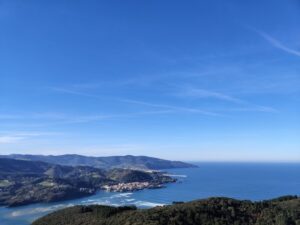
© Lukas Tacke Genannt Unterberg
that case. However, Bilbao is part of the former Basque-county. Even if it is technically Spain, the people are often quite proud of their heritage. Some might take it as an insult, if you call them Spaniards. Additionally, the Basque language is very prominent. You will hear it on the streets and read it a lot on signs. It is very different from Spanish, so don’t be fooled thinking it is just some form of dialect you might be able to understand! All in all I must say, people were very welcoming and most of the time happy to help and communicate, even if there isn’t actually a common language between you. The level of English capabilities is very low in that area, so basics in Spanish or Basque can be very helpful.
Day to day life:
Coming from the culture, food plays a very significant role there. Pintxos (A slice of bread with ANY savory toping you can think of) might be the most prominent one. You can take them for lunch or in the evening with some drinks. Since the city is next to the ocean, fish and other seafoods are integrated in a lot of dishes. If you are a vegetarian or a vegan, it might be hard for you. In more traditional restaurants the vegetarian dish is just a salad or something along that line, so you might want to go to more modern places.
When it comes to going out in the night, Bilbao has a lot to offer. Especially in the casco Viejo (old town) the bar density is very high. But also throughout other parts of the city, you will always find a nice place to grab a beer or a Kalimotxo (popular Basque drink, red wine with cola) and some Pintxos. The club landscape is definitely more restricted. For most clubs, you have to love reggeaton, since it will be played the whole night. But there are also some clubs, where the music choices are more diverse (strong recommend for “Sala Sonora” for Saturdays).
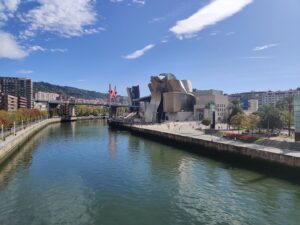
© Lukas Tacke Genannt Unterberg
Public transport is ridiculously cheap and easy in Bilbao. You go to any bigger metro station and buy a “Barik Card”, on which you then can load money. From then on, you just touch-and-go for trains, buses and the metro for prices mostly below 50 cents per ride. The metro also goes all the way to the ocean. Plentzia and Sopella are the beaches reachable by metro I recommend the most. If you want to explore the area, for hikes or to visit other towns nearby, going by bus (Asta or bizkaibus) is a very good option. Most beautiful places I have seen are: San Sebastian, Gangekogorta and the Urdaibai area.
When it comes to work life, in my case it was very similar to my experiences in German companies. Similar working hours, with maybe a longer lunch break and in my case an amazing office climate. My co-workers were always happy to help with tasks or problems at work, but also with recommendations what to do in the area on weekends or which restaurant to go to.
My stay in Vienna – a truly transformative experience
- Business Administration and Engineering: Mechanical Engineering B.Sc.
- Austria, Vienna
- Austrian Institute of Technology
- 09/22 – 12/22
My name is Eva, and I spent September till December 2022 in Vienna doing an internship at a non-university research Institution, in the area of energy technology.
My half year Erasmus experience in Vienna was an incredible journey that completely exceeded my expectations. I arrived in the city in September, feeling a mix of excitement and nervousness. I didn’t know anyone in Vienna, and I was worried about how I would make friends and adjust to living in a new country. But from the moment I arrived, I was pleasantly surprised by how welcoming and friendly everyone was. I really fell in love with the beautiful city of Vienna. To be honest, I was obsessed to do my internship in this city. I have never been there before, but my sister who is currently living in Zurich (I am a bit of a fan of this city as well) told me it is almost as beautiful and a lot cheaper. Spoiler: it is definitely more livable as a student because you can actually afford activities. The cost of living is not as cheap as in Aachen, but still within the range of big cities like Munich or Hamburg.
One of the first things I noticed about Vienna was its stunning architecture. The city is filled with gorgeous buildings and landmarks. I spent many afternoons wandering the streets, taking in the sights and soaking up the rich culture of the city.
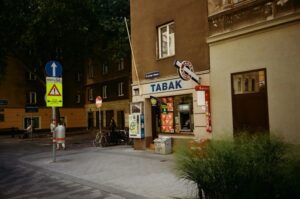
© Eva Paeffgen
In Vienna there are no kiosks, so everywhere are little “Trafiks“ which look really cute. If you want to get a beer in the evening, it is difficult, because supermarkets are closing at 8 pm. But you always can get one at a Würstelstand. My favorite one is the `Wiener Würstelstand´ in Pfeilgasse crossing Strozzigasse. I can recommend the vegan bosna. On the weekend they do organize little events with pretty cool live music.
I was really lucky! In my office I sat only with interns, bachelors students, masters students and PhD students. So it did not take long till we went on for a beer or other activities. My colleagues and I went bouldern. The company were paying half of the price to support sport activities. We also went for paddle, weird sport.
It was also really affordable to do some yoga, in the “oneYoga“ studio it is possible to test all classes for 30 euro for one month after that it costs 90 euro what’s still okay if you go three times a week.
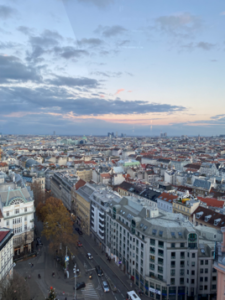
© Eva Paeffgen
I was living in a shared flat with another girl, I found the place on WG-gesucht. It is not easy to find something, but that’s only because no flats are rented with furniture. Everyone else I have met said if you are staying longer, the market really is alright because of social housing. Our flat was in the 8th Bezirk Josefstadt, I would recommend living in the area. It took me 35 minutes to work by train but only a 10 minute walk to get in the city or in the 7th Bezirk which is absolutely my favorite. Full of little restaurants, cute boutiques and nice bars. Maybe a few recommendations: Bars: Espressobar, Cafe Anno, Cafe Benno (they have a lot of games, and you can eat really good kasespätze there). Breakfast: Cafe der Provinz, all you can eat for 18 euro, with a good quality of food, most of them vegetarian and a lot of vegan stuff. Party: there is a website called Vienna wurstelstand -making the most out of Vienna and life. Every month they make recommendations about cool events. My friends and I did a lot of it. Went to art galleries, little concerts or parties. It is also nice to get to know Vienna, so take a look. Restaurants: pizza bussi ciao, mamamon thai or nguyens pho haus.
The picture on the left was taken from the top of the “Haus des Meeres“, you can get up there for free, but it is also possible to have a drink or eat something there. I would go up for the view and get a beer in the area, there are a lot of little cute bars around.

© Eva Paeffgen
If you are also going in winter, you should take a walk on the Kalenberg, it is not far from the city and for me, it was really important sometimes to get some nature and fresh air between all these massive and impressive buildings. There are a lot of Heurigen (vine farmers that are selling between their fields) you can drink „Sturm“ and with good weather you get a beautiful view over the city.
I also had the chance to travel on the weekends. I went to Bratislava which is worth a visit, it is only two hours by train and the city has much to offer. Budapest is a four hour trip, in my opinion you have to stay overnight to make it worthwhile.
Last thing: withdrawing money costs fees, but you can get it for free from the supermarkets.
Overall, my half year Erasmus experience in Vienna was a truly transformative experience. I grew as a person and learned so much about myself and the world around me. I am so grateful for the opportunity to do my internship abroad and to have had the chance to live in such a beautiful and culturally rich city. I will always treasure the memories I made in Vienna and I hope to visit again someday.

